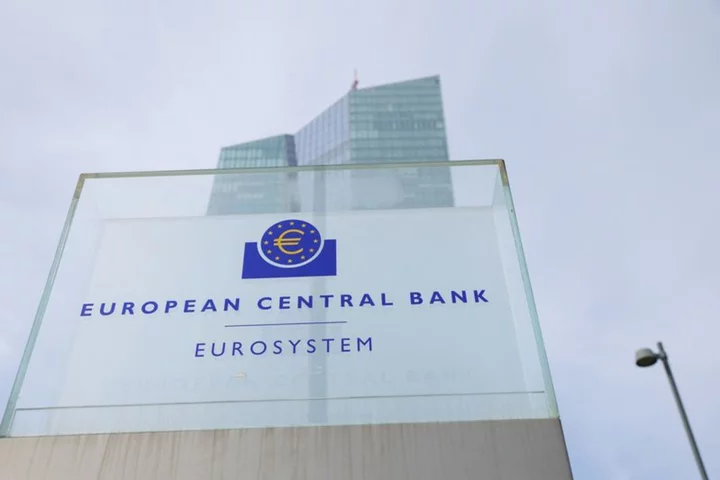By Yoruk Bahceli and Naomi Rovnick
The European Central Bank steered clear on Thursday of signalling any big policy shifts that could have unsettled investors that are already grappling with a raft of risks from war, oil prices and tighter credit conditions.
The ECB paused an unprecedented hiking cycle in which its main rate has risen to a record 4%, from below 0% in July 2022, as inflation slows and the bloc's economy deteriorates.
That was a relief to financial markets, roiled in recent weeks by a surge in government bond yields led by U.S. Treasuries.
Crucially, the ECB did not discuss any changes to a key bond-buying scheme that it uses to support more vulnerable member states like Italy, whose debt has come under pressure in recent weeks.
The central bank reiterated it would reinvest all the cash it receives from maturing bonds it holds under its 1.7 trillion euro pandemic-era bond scheme until the end of 2024.
Several policymakers have already floated an earlier end to those investments, which give the ECB more discretion to decide where to deploy them. To many investors' relief, this issue didn't make the agenda, President Christine Lagarde said.
Similarly, the ECB also did not discuss further cuts to the interest it pays on commercial banks' deposits, a move Reuters had previously reported some policymakers are considering pushing for next spring.
"Lagarde had one mission and she delivered to that. She didn't want to rock the boat, and she delivered," said Piet Christiansen, chief analyst at Danske Bank in Copenhagen.
Euro zone government bond prices rallied and yields dropped, led by Italy, while the euro held around $1.053.
The risk premium the Italian government pays over German bonds dropped below 200 basis points, a level that was breached for the first time in months in September, after a rise in Italy's budget deficit target sparked concerns.
Euro zone bank shares, which dropped sharply earlier on Thursday, cut most of their losses, also helped by faster-than-expected U.S. growth during the third quarter.
Lagarde said little about the Hamas-Israel war to unsettle markets. The Bank of Canada kept rates on hold on Wednesday, but the ECB was the first of the biggest central banks to set policy since the conflict broke out on Oct 7.
Investors have, so far, shown little sustained reaction to a conflict that could threaten energy supply if it escalates, lifting inflation just as central banks are trying to stamp it out.
The euro zone is heavily dependent on energy imports, which leaves it more vulnerable to geopolitical upheaval. The risk on Thursday was that any hawkish messaging around oil prices could have raised expectations for a further rate hike.
HIKE NO MORE?
Instead, the ECB kept the emphasis on slowing inflation, raising investors' conviction that September's rate rise was the central bank's last. Right now, markets show there is less than a 10% chance of a further hike this cycle.
"Overall I think it was pretty dovish. The ECB is starting to be less worried about inflation and more concerned about growth," said Algebris Investments fund manager Gabriele Foa.
Lagarde stressed that a debate on rate cuts was premature and would not say that rates had peaked, but traders stuck with their bets on rate cuts next year.
But for all the initial relief, there are several risks on the cards. First, sources told Reuters the discussion over ending reinvestments had merely been delayed for a few months.
And inflation risks have not disappeared.
"There remain several risks that may keep inflation stubbornly high, including increasing wage growth and the uncertainty in the Middle East which is pushing up energy prices," said Marcus Brookes, chief investment officer at Quilter Investors.
Oil prices have dropped from the highs around $93 when the conflict started, but they're still 5% above where they were before it erupted.
And European natural gas prices are up over 30% since the start of the war. European gas storages are filled to a record 99% of capacity, but it highlights future challenges for the region, which was forced to wean itself off cheap Russian gas when the invasion of Ukraine unleashed an energy crunch.
If sustained, that could all "leave the door open for a potential rate hike," said Pictet Asset Management senior economist Sabrina Kanniche.
(Reporting by Yoruk Bahceli and Naomi Rovnick; Editing by Amanda Cooper and Nick Zieminski)

